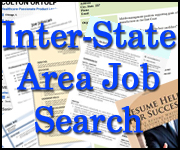News
Local News
Posted: Jun 23, 2020 3:35 PMUpdated: Jun 24, 2020 12:36 AM
House District 11 Candidates Speak at Forum

A virtual forum sponsored by the Green Country Republican Women's Club, Washington County Republican Party, and Phillips 66 was held at Bartlesville City Hall on Tuesday night.
The forum could be heard on KWON AM 1400, FM 93.3, and it could be viewed on KWONTV.com. To watch a replay of the forum, click here.
During the event, the public got to hear House District 11 Representative candidates Wendi Stearman and Derrel Fincher, the incumbent, speak ahead of the Primary Election next Tuesday.
Below is the breakdown of how the night went:
OPENING STATEMENTS:
Fincher:
"I am the State Representative currently for District 11. As a candidate for this race I believe it is extremely important to be accessible. I'm always available. If you need me, feel free to call, write, text or email. You can find my contact information in a number of places. For those who don't know, I am a graduate of Bartlesville-Sooner High School, which was around in the mid-70's to early-80's. After that we ended up at Oklahoma State where I got a degree in engineering. Started working the Oil Patch right here in Oklahoma. Ended up moving around in the oilfield services industry throughout out the U.S. and throughout the world. After doing that for 15-years or so, I got another degree in engineering and switched to teaching. Became a teacher, got a couple of degrees in teaching, including a doctorate degree from Pepperdine University. I've been a classroom teach, I've been a technology director for a district where I oversaw all the technology that goes in and what happens in the classroom as far as the technology goes. My wife is here - Bridgette - we've been married for 41 years. We have two children together. We also have two Bartian grandchildren that we are very proud of who will be attending public schools in the state, which is very important. I believe in the values that are important to this community and I've been proud to vote for those values. But what we're really working on here tonight is how do we move Oklahoma forward? One of the challenges that we actually have is that with our current crisis, we have some complex problems facing us, and we have problems that haven't yet surfaced. Tackling those requires someone that not only knows Oklahoma, but also has the background life experience to be able to take on those unknown challenges and solve them. With a worldwide background and experience in industry, education, technology, I do have that background, so on June 30th, I would appreciate your vote for Derrel Fincher. Thank you."
Stearman:
"I was born and raised in Oklahoma. I have chosen to raise my family here. Oklahoma feels like home, and I am proud to be an Oklahoman. My husbands jobs allows him to live anywhere in the country, so we looked all over the country and ended up settling on the hills of Washington County. We love the beautiful Oklahoma views and the relaxed, laid back Oklahomans. My husband was an Air Force pilot, so flying is one of our favorite family hobbies. Our 17-year-old and I are student pilots, so if you see a cute little yellow airplane puttering around, it may be one of us. I attended Pensacola Christian College, but I decided to be a mom as my career of choice, and I have never regretted this decision. I have six children - one girl and five boys. Three are grown. Two are married. I have one two-year-old granddaughter. I've been fortunate to stay home will all my kids and homeschool them. My husband travels regularly, and his busiest times are when schools are out, so homeschooling gives us the flexibility that we need to work with his schedule. I'm very involved in my community, and I'm happy that I get to volunteer on a regular basis with the various groups. I enjoy working with people to accomplish a goal. Children's Musical Theatre here in Bartlesville is a favorite organization of mine, and I've spent many days creating props and painting set pieces as well as wrangling kids during performances. [CMT] is a well organized program, and I look forward to many more summers with that group. When I see a need around me, I attempt to find a solution. Five years, ago I found it and now lead a homeschool cooperative, and it has grown to include 200 families with over 400 students. I've coached robotics teams for over six years, multiple teams at a time, and I've spent summers planning menus and running a kitchen for a children's camp, so I have the flexibility to volunteer my time and I do that. I just enjoy working with people and listening to people. I decided to run for office simply because I disagreed with the decisions that were made by some of our legislators that were made over the last two years. I believe as a citizen of the United States and of Oklahoma that it is our duty to hold our government in check, so I desire to represent the interests of people of District 11 in this effort.
QUESTIONS:
1. What is the responsibility of an Oklahoma State Representative and how are you qualified to represent the people?
Fincher:
"First, in the constitution, the duty of the Representative is defined only as "doing a budget." That's all in the constitution that we are required to do. We can also pass laws but there is not requirement for that. In the word "representative" is the word "represent," and our goal is to represent you, to represent your values, it's to understand what we're doing. A lot of what we do deals with working on bills. One of the things is to understand the values, and we know that this district has some great values like pro-life, pro-Second Amendment, and personal freedom and I've been proud to vote on those values as we go through them. But of the part of representative that we are able to do is to be your advocate for state government. Sometimes you just run into a problem, or you run into an issue working with one of the agencies, we can be your advocate and figure out where it needs to go and untangle it. Recently, one of the real challenges we've had has been with unemployment. I personally have spent a lot of time working with people and have helped them navigate the unemployment system. The hard part is listening to some of the stories. We've had to direct people on how to get food. That's just a terrible thing, so we really just want to make sure that they are able to take care of these opportunities and that they are actually able to go out and get the funds that are due to them. A lot of this is us being able to be your interface, remove road blocks, and represent you effectively."
Stearman:
"A representative of the people should represent the interest of the people. I do not believe it is the responsibility of the representative to look out for the interest of government entities. My goal is to represent the concerns of the people at the State Capitol and to keep the government from interfering in the lives of ordinary citizens. I believe I am qualified because I am familiar with the citizens of the area. I share their values and that I can vote accordingly with their values."
2. In this next legislative session, what are your top three priorities?
Stearman:
"My priorities will be to restore reverence for the constitution, to protect individual liberty, and to cut wasteful government spending."
Fincher:
"Understanding that things can change as we did last March, the legislative session changed dramatically, but knowing what we know right now, reviving the economy would be the first priority. How do we get this economy back up and running, and how do we get everybody able to work, get back to work, and do so safely. Second thing: budget, budget, budget. I can't begin to tell you how complex that budget is going to be. We actually did really well this year with how we worked through the budget with the challenges that we had. What's going to happens with the budget will depend on how well we're able to go through and how well the economy comes back, so we have to revive the economy. The third part is education. We can't stop educating our children like we can't stop people working. We have to make sure we have a good, solid education system. That's going to require some flexibility in how we actually do education."
3. As the state and its citizens continue to heal from the COVID-19 pandemic, what changes through legislation would you like to see enacted to ensure safety and at the same time preserve and promote the state's economy?
Fincher:
"First, we need to go back and visit the emergency orders. The second thing is safety as we work on the economy. One thing that I think we've missed in doing this is talking about the responsibility that we have toward others. While we have safety, there are many things that we can do to help others safely. For example, if you look around the room, you will see people wearing masks. We took ours off because we're socially distancing. Rather than passing laws to do that, you run a good public relations campaign, and governments do this all the time. What works? What's right? How does that help us move forward? That is something that will help us get back to work safely, and of course we have to think of all our rules and laws that we have. For example, we made curbside delivery for liquor possible so people didn't have to go into the liquor stores. Are there other things that we need to do to make it easier, especially for restaurants? One of the challenges for restaurants is that if you have to maintain social distancing, how do you still maintain the volume of business that you've already had? So we're going to have to go back and see how all that works in there. There's a whole lot that is packed into this."
Stearman:
"I would like to see the people having the freedom to make their own choices; the choices that are in their own best interest. I think that with that freedom, Oklahomans will rise to the challenge. I think that the ability for small businesses to take precautions as they see fit to be necessary, and should be protected for those people, so that they can continue to earn a living. I would like to make sure that the individuals have the freedom to do what they think is best."
4. With the COVID-19 crisis, are you for a requirement that students enrolled in Oklahoma Public Schools get the COVID-19 vaccine when available?
Stearman:
"I would say no. I think that whatever vaccine a child should get is up to the parents. If a parent wants their child to have that then absolutely, but I do not think that that is something that should be required. Just optional."
Fincher:
"I wouldn't require that they do that, but at the same time, as we understand more about it, do you have a right not to get the vaccine and then infect others? That is the real question that we are going to have to discuss and bring out is do you have the right the right to infect others if it's something that is transmissible."
5. How do you create state budgets for highly uncertain times?
Fincher:
"Government has to work. No matter what happens and how uncertain, government has to work. You also have to look to the future and look at planning when you're trying to look at uncertain times. You're also looking at what might happens two, three, four years down the road. And we have this process with the transportation system that allows us to see what the future might look like through the Eight-Year Plan. As our funding grows and shrinks a little bit, we're able to move that plan back and forth, extend it or shrink it up. The second thing is making sure that you don't spend all your money. This is Economics 101. Any family does this: you always put money away to save. We've done a couple things with that like the Revenue Stabilization Fund and the Constitutional Reserve Fund (aka the "Rainy Day Fund"). [The Rainy Day Fund] saved us this time. But the focus now as we move forward is not to look at just what's going to happen next year, but what's going to happen the year after that or the year after that. if we're going to get the income for that, we're going to have to diversify the economy. We're heavily dependent on oil in this state, we are going to want to diversify our economy so we can bring in more revenue. Long-term - make sure agencies are effective and efficient, and go out and make sure they are not asking for things that they don't need. If they are, we have to reduce the scope of the agencies."
Stearman:
"The state is going to need increased revenue. I think that state budget should be limited. As I understand it the state legislators budget was passed by overriding Gov. Stitt's veto and it will have to be funded. This will likely be done through tax increases, and I do not want the people of Oklahoma to have to foot the bill for this budget. I believe fewer regulations and lower taxes will result in increased economic activity and thus create increased revenue. Any budget shortfall is a spending problem and not a revenue problem. The answer to a budget shortfall is reduced spending."
6. The Oklahoma Republican Party Platform states: "We support a Taxpayer Bill of Rights." It also states that "We support the elimination of the Oklahoma state individual Income Tax." What is your position on state income tax levels? Do you believe we should work towards a taxpayer bill of rights? If so, what would be the most important items to include?
Stearman:
I think taxes should be limited to provide for essential government expenses. I agree with keeping more of the money in the hands of the people who earned it. Yes, I would be in support of changing the income tax."
Fincher:
"You ought to have a tax payer bill of rights. You have to know what your rights are. You ought to be able to exercise them and know how it works. One of the challenges that we have with state income tax is if you recall back in the past when they are trying to eliminate the state income tax they kept pointing to all these other states that didn't have income tax. The problem I had was that those states had much higher property taxes and other types of taxes to fund their government. One of our challenges is State Questions 640. For those of you who don't know, State Question 640 is the one that requires a legislative super majority - 75-percent - to do any tax increases, which means that if you want to re-balance taxation, so that it's better, that you're doing it in a fair way, that may involve reducing taxes in some high tax areas while pumping them up in lower tax areas. The challenge with that is the super majority. You then allow a small minority to control what you do with taxes, so you can't even do good taxation without changing overall rates of taxation. You can't even do that. If we eliminate the state income tax, you're going to end up without enough to fund the government. Yes, government should only do what's essential. if it weren't essential, we wouldn't be doing it. I'm happy to look at anything that we're doing and see if we can't take it because that is how we reduce the cost of government - you remove the scope of government."
7. Is there a difference in a principled and political vote - are both appropriate at times?
Fincher:
"Be willing to compromise, but never compromise your principles."
Stearman:
"I don't think so. I think that it is necessary when it comes down to the actual vote to be principled. I think there can be politicking done before to work out the best possible bill, but when it comes down to the actual vote, I will vote on principle and I think that is what is necessary."
8. The Oklahoma Republican Party Platform states: "We believe that at the point of conception, a person is granted the rights guaranteed in the U.S. Constitution." It also states that "We support a U.S. Constitutional Amendment protecting innocent human life of the unborn." Do you believe the Oklahoma Legislature has done enough to protect the unborn? If not, what else do you believe that could be done in Oklahoma to afford those rights to the unborn?
Stearman:
"I have looked at several of the bills that have gone through this last session, and I don't know what the perfect bill is. I would like to find it. I do not want any unborn child to lose its life. They all have potential, they all have that right. My goal will be to find a way to make sure that everyone has that right at all stages of life from unborn until they naturally die."
Fincher:
"We're sure trying, and we're trying hard. Oklahomans for Life ran multiple bills. I was proud to vote for those bills. The challenge that we run into is getting bills through that haven't been overturned before in court because it just immediately stops, so we go through and try several different things. We're trying to work on all these little areas that really haven't been tested before to see if we can test those. This is one of those things where you really have to push the limits all the time. If you just go out and do a big thing, it gets stopped immediately, which often effects the progress that has been made. That has been the challenge. There had been a bill that was going around that people were talking about that would abolition abortion. The problem is that is tosses out everything, and if the bill got overturned in the court, it would've overturned all the previous protections that we had in there which is what made it difficult."
9. Do you plan to hold periodic town halls during your term to hear the concerns of citizens in a public forum should you be elected? If not Town Halls - how else do you plan to continue to listen to constituents?
Fincher:
"I hold town halls. I advertise them to constituents and people show up. One of the challenges that we have with town halls is getting a lot of people there. Part of the way I connect with constituents is by sending out a newsletter. If I have your email address, anybody is free to write me. you will receive a newsletter from me talking about what is going on. I also do get constituents who write me. If you do write me, please include your address so I know if you're a constituent. It also helps if you include a phone number. Sometimes it is easier to pick up the phone, give you a call and talk about what is going on. The town halls are important. I want to look into how effective virtual town halls can be to connect with people."
Stearman:
"That has been my favorite part of all of this campaigning: meeting the people. Absolutely, I will hold town halls. Absolutely, I will connect with people in any way they want to connect. Let's go have a cup of coffee. It doesn't matter to me. Talking to the people is what I have enjoyed thoroughly during this campaign. Absolutely, I will."
10. What changes in post-secondary and higher education do you think will best serve Oklahoma?
Stearman:
"I'm not that familiar in that area to have a thoughtout plan. I would have to talk to the people who are involved in education and find out what they desire, what they think is necessary to improve it, because I don't feel qualified to just know that off the top of my head, but I certainly am interested to find out what those who are in education would like to see done."
Fincher:
"We need increase the number of people getting some sort of post-secondary credential that has labor market value. That's basically a buzz word that says you have something beyond a high school diploma that shows that you are able to do something. That can be a college degree, that could be a welding certificate, it could be something that shows that you are ready to go to work. We'd love you to be an entrepreneur. Unfortunately, what we found is that most people who are 18-years-old are not quite ready to start their own businesses as we move forward. Most entrepreneurs have picked up a lot of experience beforehand. The other challenge we have is how do we bring people on? If you think about and provide higher ed opportunities, how do you do the outreach so that if someone is 35, and they're in a low-skill job because they don't have many skills, how do you bring them back? You need to work on how you give them child care, how do you help them support their family, and the whole idea with this is that it is cheaper to do that and have them get a good job and pay good taxes and contribute to the economy than to stay in a low paying job."
11. What is your position of choice in education and what role should State Government play?
Fincher:
"As I have been looking at choice, every child should have a great education. Sometimes that does involve choice. The question that we run into is, how do you pay for that and make sure that it happens? I think that we should have choice in education. We have to show how we can help everybody, and not target one group of people that is already getting aid in other areas."
Stearman:
"I like all forms of education. I am a homeschool mom so I am very interested in education. I support all forms: the public, the private, the homeschool. I like education to be in the hands of the parents, not the politicians."
12. Education Funding has been a topic of conversation for decades. With the current changes in funding, has the state gone far enough or is there additional work to be done?
Stearman:
"I would not like to increase taxes anymore. if funding comes from more taxes then I would like to avoid that. I would love to see any wasteful spending reduced so that more money can go to the classrooms. I think that we can all agree that the education is about the kids, so I would love to find a way to get as much money as we can into the classrooms for the kids and the teachers as possible."
Fincher:
"There is additional work that needs to be done. We were so concerned with our drop in available funds that we did not want to go back on what we did and take a step backward. Remember, teachers were leaving the state. We couldn't get teachers. We haven't progressed much because changes haven't been in effect very long. But if we want to be a Top Ten state in anything, we have to have a world class education system. That's going to take some extra funding. Part of the way you do that, and a lot of the way, is that you grow and diversify the economy to make sure that that happens. The other part is restructuring the schools and thinking about what the future of schooling will look like. That's something we need to look for down the road. How does that make our school better and more effective? How do we as we work with the kids help them understand what it means to work in society? Any company wants people who can work together, who can collaborate together and who can communicate with each other whether they are in the room or across the world, and create new ideas that none of them can do alone. Our education system needs to get to a point where it includes all these things. It's not just about the content we're doing now, it's the creation that you have to be able to do at that time."
13. What role should the state government play in the life of Oklahomans?
Fincher:
"When [government] works well, you shouldn't notice it. You should be doing everything that you want and not feel any restrictions, so it should be just as little as possible. But it needs to do a couple things. We need the safety aspect. We also need taxes. We haven't gotten to a point where we can fund the government without taxes. [Government] should also keep you safe in your home. It should allow you to be sure that when you buy products that the products are safe. It should allow you to know that if you buy a home, it is not going to fall down. It should also provide that people you work with are properly licensed."
Stearman:
"Government should be a second thought, not something people are aware of all the time. I think the government is there to protect our human rights, our lives, our property. While some taxes may be needed, I will certainly make every effort to reduce taxation as much as possible until people start complaining that they are not paying enough in taxes. That would be my goal. I don't view safety as a job of the legislature. I believe that we as free Oklahomans can keep ourselves free. As Ronald Regan is famous for say, 'Government is not the solution to a problem. Government is the problem.'"
14. Oklahoma passed Open Carry in the last legislative session. There was also an anti-red flag bill that passed and was signed into law. What additional steps, if any, would you take to secure the 2nd Amendment rights for Oklahomans?
Stearman:
"I would never vote against anything that would infringe on the right of people to own and carry firearms. I believe that the Second Amendment is very clear when it says, "shall not be infringed." There is a reason for that, so I would protect that completely."
Fincher:
"I voted for both of them. One of the bills that didn't make it all the way through was a bill that would've actually allowed us to ignore an unconstitutional federal statute should their ever be one. That is a bill that we will be hearing next time around as I am understanding if we can make it through and go for that one. We would be able to ignore the federal laws that turn out to be unconstitutional."
15. We have a mental health crisis in Oklahoma. What actions should we take to address the crisis?
Fincher:
"It manifests in our prisons because that is where so many people end up that have mental issues. They get picked up and they end up in crisis. When we talk about education, we first make sure that we have counselors to start working with kids who may mental health issues and identifying way in which they can get help early. When you have a mental health challenge, you're much better off taking care of it early and working with it early. If you talk with therapists, if they can identify the crisis before it starts, they can set them up with the therapy they need to help them overcome it. If you wait until it is a full blown crisis, it takes a lot more time and a lot more effort. Northeast Oklahoma is known for working with Grand Lake Mental Health and I want to see that become the norm across the state. Every law enforcement agency has an iPad in their car, and if they run into somebody that is going through a mental crisis, they can push a button on the iPad and instantly speak with a certified counselor. Not only that, but they can locate a bed for them if they need to be in care. Instead of taking that person to the hospital or jail, they are able to take them to bed where they can receive treatment at one of the facilities."
Stearman:
"Reducing regulation in healthcare is going to help bring more healthcare workers to Oklahoma. it will give us more opportunities to have more people that can work in this area. I have no clear direction on that. That would be another area where I would talk to the people in that field because I don't know what they need, and i would do what I could to help them as they felt they needed.
Closing Statements:
Fincher:
"As I've said before, I've been proud to vote for the values of this district, but values these days are not enough. That's going to be a challenge because we know that Oklahoma is going to continue to face complex challenges. I wish that I knew what the challenges would be that are going to be coming up. We didn't expect this a few months ago. But taking over these [challenges] requires someone who understands Oklahoma that has the life experience and background to be able to look at these and help make decisions that are good for the district and good for Oklahoma to help move us forward. As an Oklahoman with a worldwide background in engineering, education, industry and public service, I do have that background. On June 30th, I would ask you to vote to move Oklahoma forward and vote for Derrel Fincher. Thank you."
Stearman:
"I am pro-life. I am pro-Second Amendment. I am pro-education. I believe that values are at the core very important when going into the legislature. I believe the ideas of the constitution are a necessary constant. I believe that government power should be limited; I support small government. I believe the right's of the people should be broadly interpreted and believe the powers of government should be narrowly interpreted. I am truly a Christian, and I am a mother who would like to see my children and my grandchildren have the opportunity to grow up in the greatest nation on earth. I am running for office because I want the freedom of Oklahomans to be protected. I believe that the oath sworn by every elected official to uphold the constitution is a serious oath that must not be violated. This is who I am and this is how I will make my decisions when I am elected as your Representative."
« Back to News















